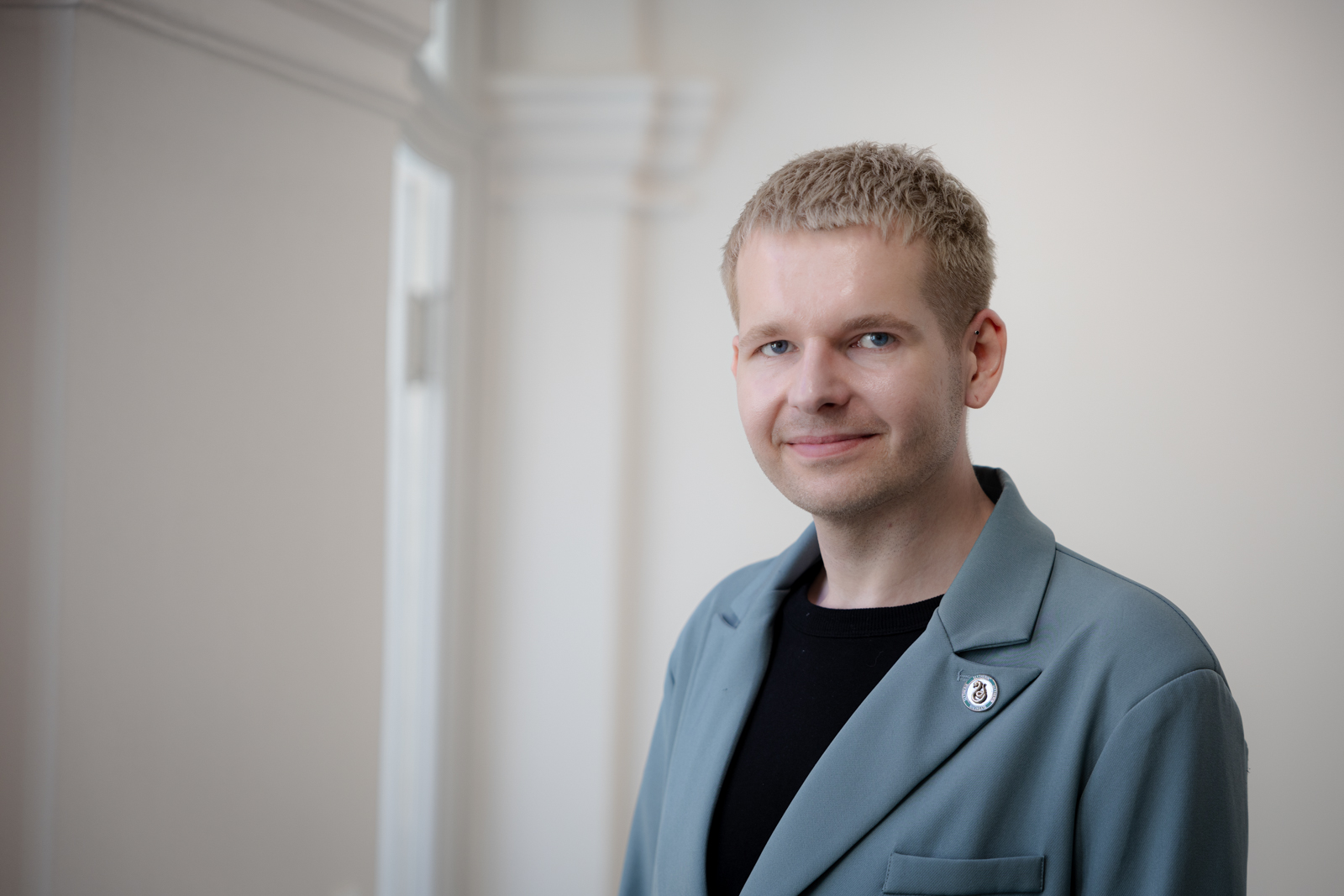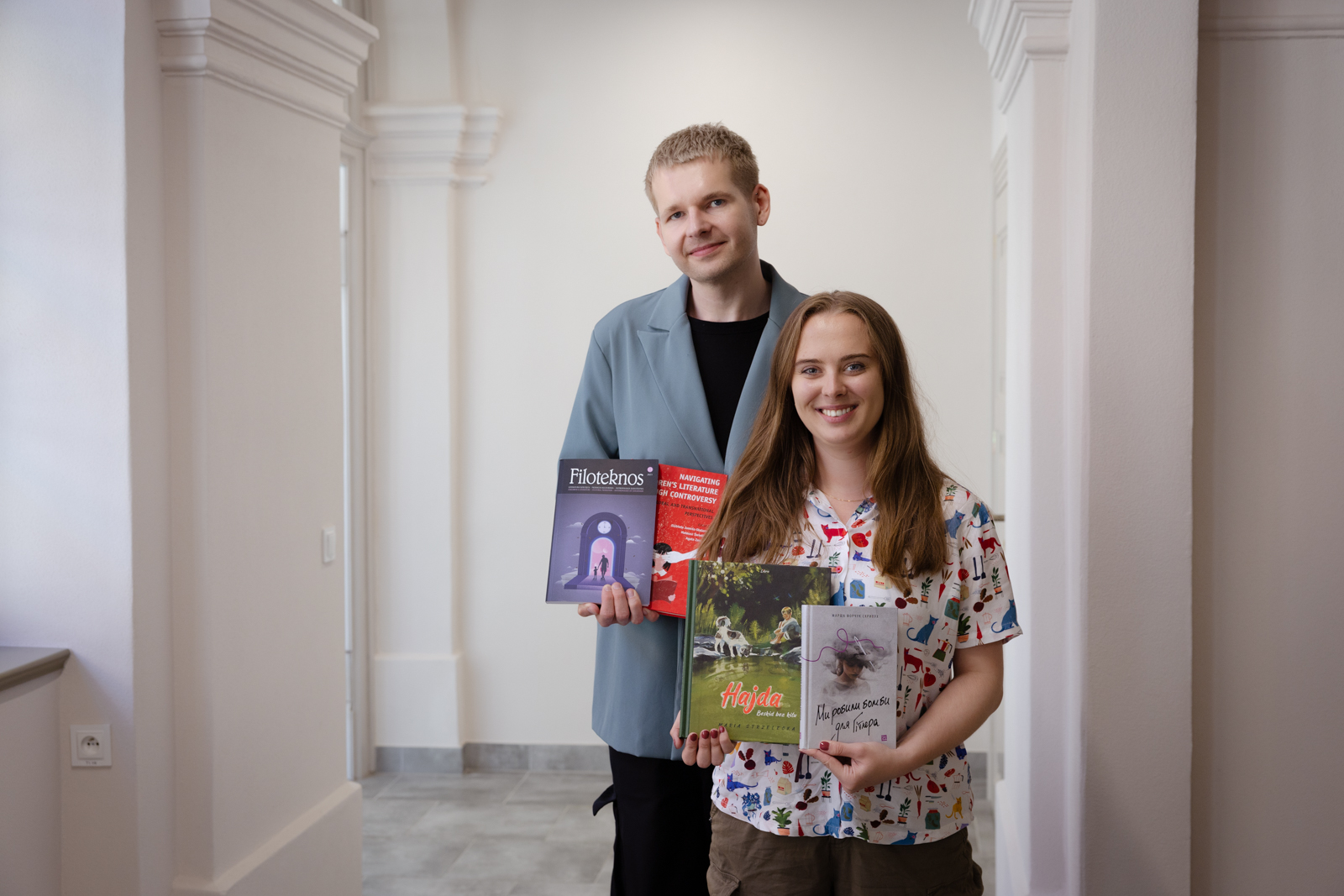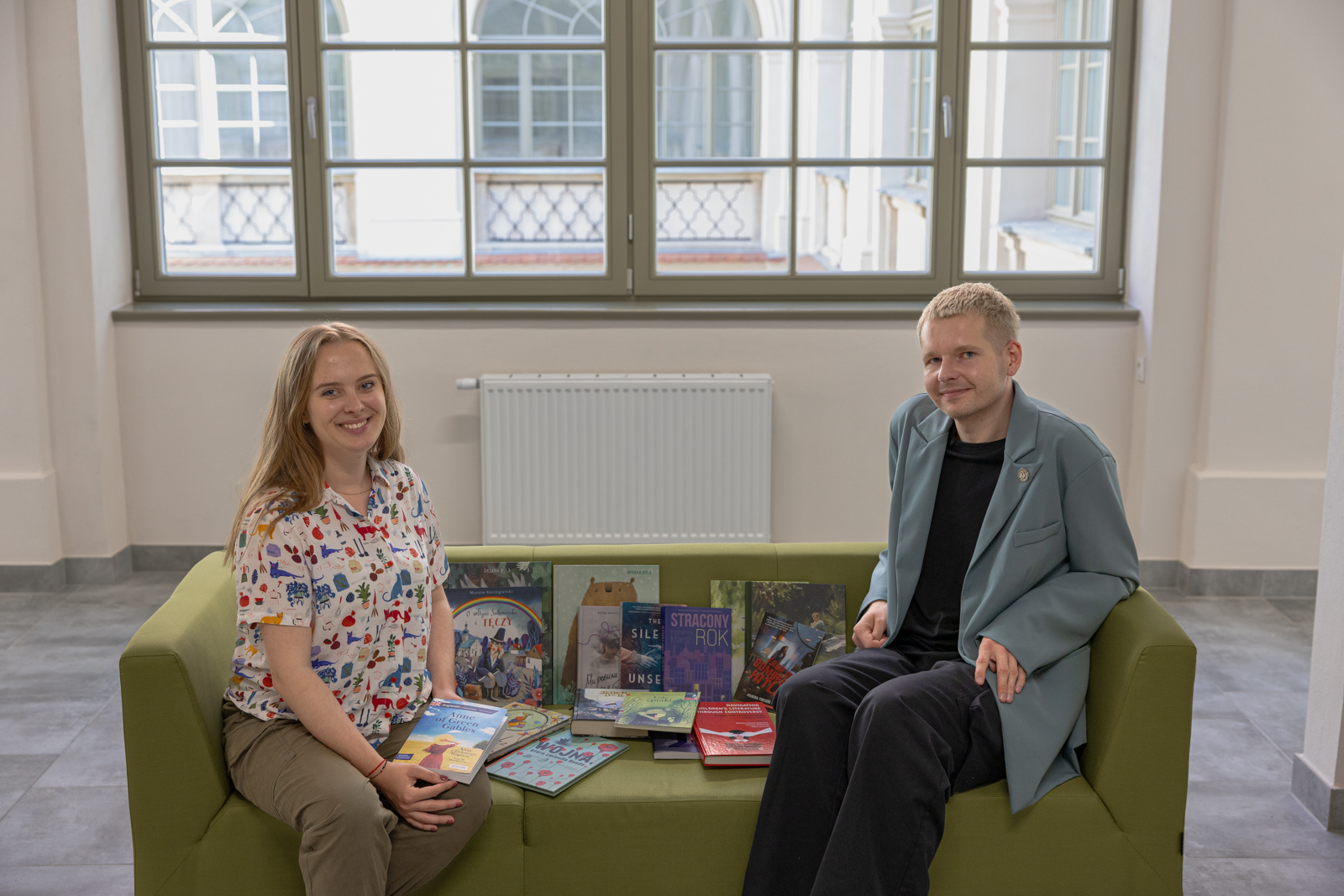
On children’s and young people’s literature on Children’s Day – a conversation with dr hab. Mateusz Świetlicki
International Children’s Day, celebrated on the 1st day of June in Poland, was instituted by the UN General Assembly in 1954. The Day is celebrated on different dates across the UN country members. In Poland, as well as in countries from the former Socialist Bloc, it has been celebrated since 1 June 1950.
Children’s Day is dedicated to the youngest promoting their rights and ensuring their well-being through various events, festivals, and educational activities. The Sejm of Children and Youth has been organised in Warsaw since 1994. It is an initiative promoting parliamentarism among primary and secondary school students. The Young Members’ tenure is one year, with the only session taking place on Children’s Day.
On the special occasion of today’s celebration, we spoke to the Vice-Dean for Student Affairs of the Faculty of Letters, dr hab. Mateusz Świetlicki, who served as a juror in the Book of the Year Award of the Polish Section of IBBY (International Board on Books for Young People) in 2021 and 2023. He was invited by the International Youth Library in Munich to contribute to the White Raves catalogue in 2022. Dr hab. Mateusz Świetlicki is: a Director of CYPLC – Center for Young People’s Literature and Culture at the Institute of English Studies, University of Wrocław, since 2022; a co-founder and the member of the programme board of the Centre for Research on Children’s and Young Adult Literature, Faculty of Letters, University of Wrocław; an associate editor of the journal “Filoteknos”; a member of the editorial team of “Children’s Literature, Culture, and Cognition” series of John Benjamins Publishing; a representative of the Childhood & Youth Network of the international organisation Social Science History Association; and an author of numerous publications on so-called difficult topics (war, trauma, gender stereotypes) in English, Ukrainian and Polish children’s and youth literature. In 2022, Canada’s HREC Education (Holodomor Research and Education Consortium – University of Alberta) invited him to co-organise a series of webinars for Canadian and American teachers, which included discussions with the authors of English language books broaching the subject of Holodomor. In addition to his lectures at the Institute of English Studies (including a course as a part of Erasmus Mundus International Master in Children’s Literature, Media and Culture), our guest speaker also conducts literary workshops devoted to teaching difficult topics for female students of the pre-school and early childhood pedagogy subject (Institute of Pedagogy, University of Wrocław). He is a contractor of the international project “Seen and Heard: Young People’s Voices and Freedom of Expression” (project leader on behalf of the University of Wrocław: dr hab. Justyna Deszcz-Tryhubczak, prof. UWr).
Among other things, we asked for book recommendations for children, youth and young adults; the nature and the secrets of assessing the books in the Book of the Year Award of the Polish Section of IBBY; the activity of the Centre for Young People’s Literature and Culture at the Institute of English Studies and the Centre for Research on Children’s and Young Adult Literature at the Faculty of Letters; as well as about his book, published last year, titled “Next-Generation Memory and Ukrainian Canadian Children’s Historical Fiction: The Seeds of Memory” (Routledge), and a volume, co-edited with Dr Elżbieta Jamróz-Stolarska and Dr hab. Agata Zarzycka, “Navigating Children’s Literature Through Controversy: Global and Transnational Perspectives” (Brill), which is the product of the Centre’s activity. On this occasion, our guest revealed the information about the seminar organised by the Centre on 7 June and another lecture from the series “International Voices in Children’s Literature Studies,” which will take place on 20 June.

During the conversation about trends in Polish and foreign literature for children and youth, our guest emphasised variety and richness of Polish publishing market. Dr hab. Mateusz Świetlicki recommended many interesting books, not just those recognised by the IBBY Book of the Year Award (in which he served as a juror along with dr Katarzyna Slany and mgr Ewa Gruda). He also encouraged people to read the books from the post-competition BIS list.
As he was speaking about such works as Lola i ptaki by Wioletta Grzegorzewska (Czytam sobie series) and Babcocha (illustrated by D. De Latour) by numerously awarded Justyna Bednarek, dr hab. Mateusz Świetlicki highlighted he role of intergenerational dialogue in the process of adults reading together with children. The youngest children may be interested in the recommended picture books about a teddy bear and a bison from the “Tukoni” series by Ukrainian illustrator and writer Oksana Bula. Although our guest brought their translations into Czech and German to the meeting, both have also been published in Polish, translated by Iryna Vikyrchak.
Responding to a question about so-called difficult topics in literature for the youngest, he introduced the picture book Wojna, która zmieniła Rondo by Andrij Lesiw and Romana Romanyszyn, published in Poland in 2015 and so far translated into many languages. Its characters – a light bulb, a balloon dog and a paper airplane – face the titular war together. Dr hab. Mateusz Świetlicki stressed that Polish children’s literature features a variety of works dealing with issues such as the crisis of homelessness (Ten Pan by Arthur Gębki with illustrations by Chirkowska), death (Wojtuś by Mariusz Góra), or otherness and stereotypes (O sołtysie Salamonku i tęczy by Marcin Szczygielski with illustrations by Adam Pękalski; Kije samobije by Roksana Jędrzejewska-Wróbel with illustrations by M. Oklejak). He also emphasised the thriving category of youth prose and the themes of sexuality and identity that are increasingly emerging in it (Zupełnie inna bajka by Katarzyna Ryrych).
Talking about his latest monograph, our guest recommended the novels by Marsha Forchuk Skrypuch (Stolen Child) and Amanda McCrina (The Silent Unseen) to the attention of those reading in English, but he also drew attention to the thriving domestic historical prose for children and young people. A number of recently published books deal in an accessible way with important elements of Polish history, such as exile in Siberia (Antosia w bezkresie by Marin Szczygielski), the Warsaw Uprising (Jeden dzień by Katarzyna Rygiel), World War Two, Holocaust and post-war trauma (Odysejki by Dorota Cembrzyńska-Nogala, Sprzedawca marzeń by Katarzyna Ryrych), or the resettlement actions during the World War Two (Hajda. Beskid bez kitu by Maria Strzelecka). Dr hab. Mateusz Świetlicki also drew attention to the translation of Katherine’s Marsh bestselling novel Stracony rok, recently published by Widnokrąg. Through the pages of this story, the 2020 coronavirus pandemic intermingles with the history of the 1930s United States (The Great Depression) and Ukraine (Holodomor).
We invite you to watch the interview!
Editorial office: Maria Kozan
Movie: Paweł Piotrowski

We would like to remind you that the study of literature for children and young people at the University of Wrocław has begun in the 1960s thanks to Jerzy Cieślikowski, who initiated the creation of Children’s Literature Centre (pl. Pracownia Literatury Dziecięcej) at the Institute of Polish Studies, and organised the research on the children’s and youth culture, forming a research team. His work was continued by subsequent researchers, among others, prof. dr hab. Ryszard Waksmund, editor of “Baśni Krąg” series and the founder of “Filoteknos” journal, dr hab. Dorota Michułka, prof. UWr, current chief editor of “Filoteknos” journal and the organiser of many international conferences on the topic of children’s and youth literature, and prof. dr hab. Jolanta Ługowska, dr Sabina Waleria Świtała and dr Kamila Kowalczyk. The Institute runs a Postgraduate Course in Literature for Children and Young People: culture – education – new media.
It is also worth mentioning the other units of the Faculty of Letters, in which research into children’s and young people’s literature has been developed for many years. Doc. Anna Nikliborc from the Institute of Romance Studies initiated the research on foreign children’s literature, and prof. dr hab. Bogumiła Staniów conducted research on the market of children’s books at the Institute of Journalism and Social Communication. In 2003, the Centre for Young People’s Literature and Culture was founded at the Institute of English Studies, created and sequentially chaired by dr hab. Marek Oziewicz and dr hab. Justyna Deszcz-Tryhubczak, prof. UWr, and their publications and organisation activities have significantly helped to popularise the research on the children’s and youth literature in Polish English Studies. Currently, dr hab. Mateusz Świetlicki is a director of the Centre.
These activities resulted in founding the Centre for Research on Children’s and Young Adult Literature, at the Faculty of Letters on 1 December 2017. The Centre gathers researchers from across the Faculty, supporting the development of researches and initiatives concerned with children’s and youth literature from various linguistic and cultural backgrounds. Currently, dr hab. Irena Barbara Kalla, prof. UWr, is a coordinator of the Centre.
The CBLDM Programme Advisory Board for the tenure 2020-2024, approved by the Dean of the Faculty of Letters, University of Wrocław, includes: dr hab. Katarzyna Biernacka-Licznar, prof. UWr (Institute of Classic, Mediterranean and Oriental Studies), dr hab. Justyna Deszcz-Tryhubczak, prof. UWr (Institute of English Studies), dr Elżbieta Jamróz-Stolarska (Institute of Information and Media Sciences), dr hab. Irena Barbara Kalla, prof. UWr, (Chair of Dutch Studies), dr hab. Natalia Paprocka, prof. UWr (Institute of Romance Studies), prof. dr hab. Bogumiła Staniów (Institute of Information and Media Sciences), dr hab. Mateusz Świetlicki (Institute of English Studies) dr hab. Agnieszka Wandel, prof. UWr (Institute of Information and Media Sciences) and dr hab. Agata Zarzycka (Institute of English Studies) Other members of the Centre are: dr Agnieszka August-Zarębska (Department of Jewish Studies), dr Bożena Hojka (Institute of Information and Media Sciences), Dr hab. Agnieszka Jagodzińska, prof. UWr (Department of Jewish Studies), dr Sylwia Kamińska-Maciąg (Institute of Slavic Studies), dr hab. Grzegorz Kowal, prof. UWr (Institute of German Studies), Dr Magdalena Ślawska (Institute of Slavic Studies), dr Dorota Żygadło-Czopnik (Institute of Slavic Studies). People from other UWr units and other universities also cooperate with the Centre. Renowned Polish and foreign researchers of children’s and youth literature are members of the Centre’s Scientific Advisory Board.
The Centre also has a website, edited by dr hab. Agnieszka Wandel, prof. UWr, a Facebook website and a YouTube channel, with recordings of masterclasses from the “International Voices in Children’s Literature Studies” series.
Based on the article by dr hab. Agnieszka Wandel, prof. UWr.
The international activities in the field of research on children’s and youth literature, involving researchers from our University, merit special attention.
https://www.uantwerpen.be/en/projects/literature-holocaust/research-team (Dr hab. Irena Barbara Kalla, prof. UWr)
https://www.uni-due.de/biwi/koenig/dodzi/international_workshop.php (Dr hab. Dorota Michułka, prof. UWr, mgr Justyna Zając)
https://seenandheardproject.eu (Dr hab. Justyna Deszcz-Tryhubczak, prof. UWr – a supervisior on behalf of the UWr; dr hab. Mateusz Świetlicki, a contractor)
https://www.gla.ac.uk/postgraduate/erasmusmundus/clmce (Dr hab. Justyna Deszcz-Tryhubczak, prof. UWr – a coordinator on behalf of the UWr; contractors: dr hab. Mateusz Świetlicki, dr Dawid Junke, dr Małgorzata Kozubek, mgr Martyna Stec)
Translated by Michał Bogucki (student of English Studies at the University of Wrocław) as part of the translation practice.



